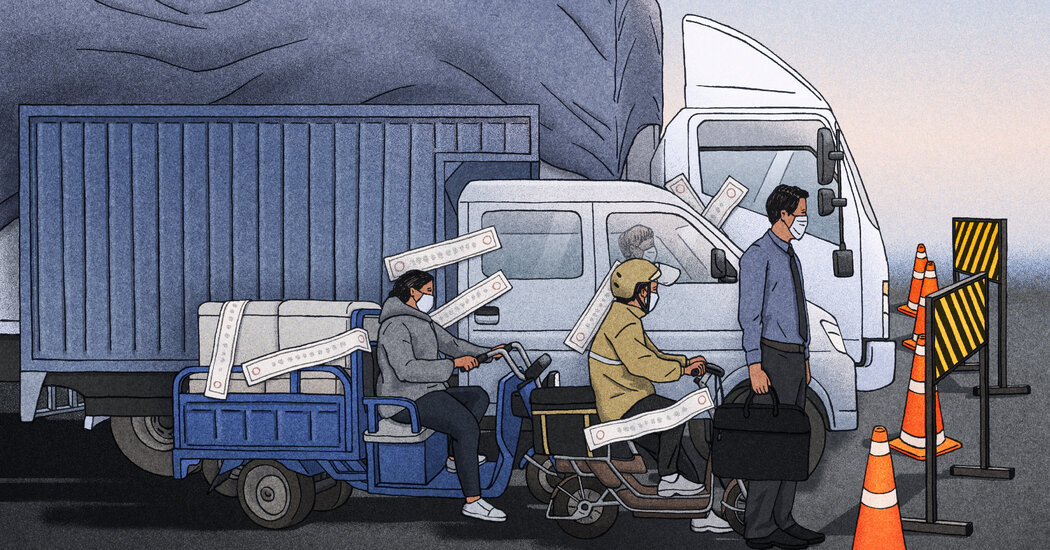
Yang Wenhui should be a proud example of China’s rise from economic rubble to global powerhouse.
Growing up poor, he ate so much cabbage that he didn’t touch it again for many years. He worked as a farmer and a construction worker before joining the country’s nascent logistics industry. In 2003, he started his own freight logistics company, striking gold as online shopping took off in the 2010s and products moved swiftly between provinces.
Then the Omicron variant of the coronavirus started spreading in China. In the government’s zealous pursuit of its “zero Covid” policy, dozens of cities along the 1,300 miles of highway between the capital, Beijing, and the southern province of Guangdong, his main freight route, imposed travel restrictions and lockdowns. Many truckers were grounded. Cargo prices rose by 20 percent in a matter of weeks.
“I’ve been in the logistics business for 28 years,” Mr. Yang, 47, said in an interview. “But I’ve never seen a mess like this. There were numerous emergencies to deal with.” He estimates that he lost tens of thousands of dollars in March.
China’s economy is a giant, sophisticated machine that requires numerous parts to work together. Behind its 1.4 billion consumers are 150 million registered businesses that provide jobs, food and everything that keeps the machine humming.
Now, in the name of pandemic control, the Chinese government is meddling with the economy in ways that the country hasn’t seen for decades, wreaking havoc on business.
Businesspeople worry that the country is going back to a planned economy, and the great Covid disruptions could last until after a Communist Party congress late this year when China’s top leader, Xi Jinping, is expected to secure a third term. A surge in cases in Beijing is amplifying global fears as well, prompting a sell-off in stocks on concerns that China’s economy could take another hit.
In the past two years, many governments around the world have sought a balance between controlling the pandemic and keeping businesses open. China was largely successful until recently when Omicron, a milder, if more infectious, variant, caused a serious outbreak. As much of the world is opening up, the country is doubling down on its zero Covid policy, making low death and infection rates central to its legitimacy.
Since March, China had reported about half a million Covid infections and 48 deaths through Friday.
Around 344 million people, or a quarter of the country’s population, are under some kind of lockdown, according to the investment bank Nomura. The lockdowns have left China’s biggest city, Shanghai, a metropolis of 25 million people, a ghost town; farmers in the northeastern granary cooped up in the spring planting season; and many factories, shops and restaurants across the country suspending their operations.
The stringent measures are exacting a heavy toll on the economy. Nationwide consumption fell 3.5 percent in March, while spending on restaurants plummeted 16 percent, according to official data.
“This is not only making it impossible for many private businesses to survive, but also accelerating outbound immigration and quickly dampening willingness to invest,” said Zhiwu Chen, an economist at University of Hong Kong. “Once people lose confidence in the country’s future, it will be extremely difficult for the economy to recover from the zero Covid policy’s impact.”
Business owners and managers are complaining that the current disruptions are worse and more widespread than those of early 2020, when logistics, commerce and industrial production in much of the country quickly returned to normal. Back then, the government’s digital surveillance systems to limit the movements of vehicles and people were less extensive.
The business community is waiting nervously to see if the government will apply the Shanghai lockdown model to other cities. The approach has a strong element of a planned economy, in which the government controls business activities, rather than letting the market regulate supply and demand.
During the outbreak, the Shanghai government upended the commercial systems and tried to provide for 25 million people on its own. The results are familiar to Chinese of a certain age: scarcity of supplies and mushrooming of black markets.
Because of Covid restrictions, commercial trucks have a hard time delivering food and household goods to Shanghai. Inside the city, only vehicles with passes are allowed on the road.
On the black market, some operators are willing to pay $2,000 for a day pass. The cost is then priced into the groceries they sell to the residents.
Some neighborhood committees allow only government-organized grocery distributions; others don’t allow their residents to purchase diapers, baby formula and toilet paper because they are not considered necessities. Elsewhere, fruit, beer and coffee are considered frivolous items.
Starting in the 1980s, China moved away from its planned economy, because it left everyone poor. It didn’t work in the former Soviet Union, nor is it working in North Korea.
Besides the troubling ghost of a planned economy, the business community is facing conflicting messages from the government. Premier Li Keqiang and ministers in Beijing have been urging authorities to balance pandemic-control measures with a need to encourage growth. The Ministry of Industry and Information Technology sent a working group to Shanghai to ensure that key companies and supply chains could resume operations.
But Mr. Xi has not budged from his zero Covid position. “Perseverance is victory,” he said on April 13. The state media, provincial party secretaries and lower-level government officials all know who is in charge and are eager to show their loyalty. Many local officials are escalating pandemic-control measures so they don’t risk an outbreak that could put their positions in danger.
The Latest on China: Key Things to Know
Some factories in Shanghai, such as Tesla and some of its suppliers, have resumed production. But they must follow a set of complicated and expensive pandemic-control measures, including creating what’s called a closed-loop management system in which workers live on-site and test regularly for the virus.
Not many companies are willing or able to do this. One senior executive of a major logistics company told me that it had only a few thousand delivery workers back on the job in Shanghai because it lacked the capacity to provide lodging for so many workers. That’s significantly lower than the more than 60,000 delivery workers the company had in peak seasons in the past few years.
The disruptions are especially difficult for smaller businesses.
A truck driver who asked me to use only his surname, Zhao, has been stuck in his vehicle, unable to work, in a Shanghai suburb since March 28 when the district was locked down. He, along with nearly 60 other truckers, have been drinking from fire hoses, struggling to secure food and without a bathroom to wash up in.
He’s losing sleep, wondering how he will cover his loans: about $2,000 monthly for his truck and about $500 for mortgages, while continuing to support his wife and their two children.
He told me that he had borrowed money from relatives and friends to pay the loans this month. If he can’t start working soon, he said, next month he will have to sell his truck.
The chief executive of a high-flying consumer brand is also wondering how long her company’s cash can last. The company raised $100 million last year and had ambitious expansion plans, she said in an interview. But nearly a third of her company’s 150 retail stores had to shut their doors in locked-down cities. Their online sales, which weren’t hurt in 2020, are suffering now because many cities shut the highway exits, halting e-commerce deliveries.
If the lockdowns haven’t eased by May 1, a public holiday in China, she will have to consider letting go some of her 1,000 employees.
She and most people I interviewed for this column asked for anonymity, because private enterprises are easy and vulnerable targets for government retaliations.
John Ji, a real estate developer in Nanjing of Jiangsu Province, is anxiously watching the lockdowns in Shanghai and other cities. He believes that many people will lose their jobs and have difficulty paying mortgages. When nobody can afford housing, he asked, who will buy his apartments?
Mr. Ji also grew up poor. Before he turned 10, his staple was sweet potatoes; he ate meat only a couple of times a year.
“I’m worried whether we’re going back to a planned economy,” he told me. “If the economy keeps slumping, we might become poor again.”




